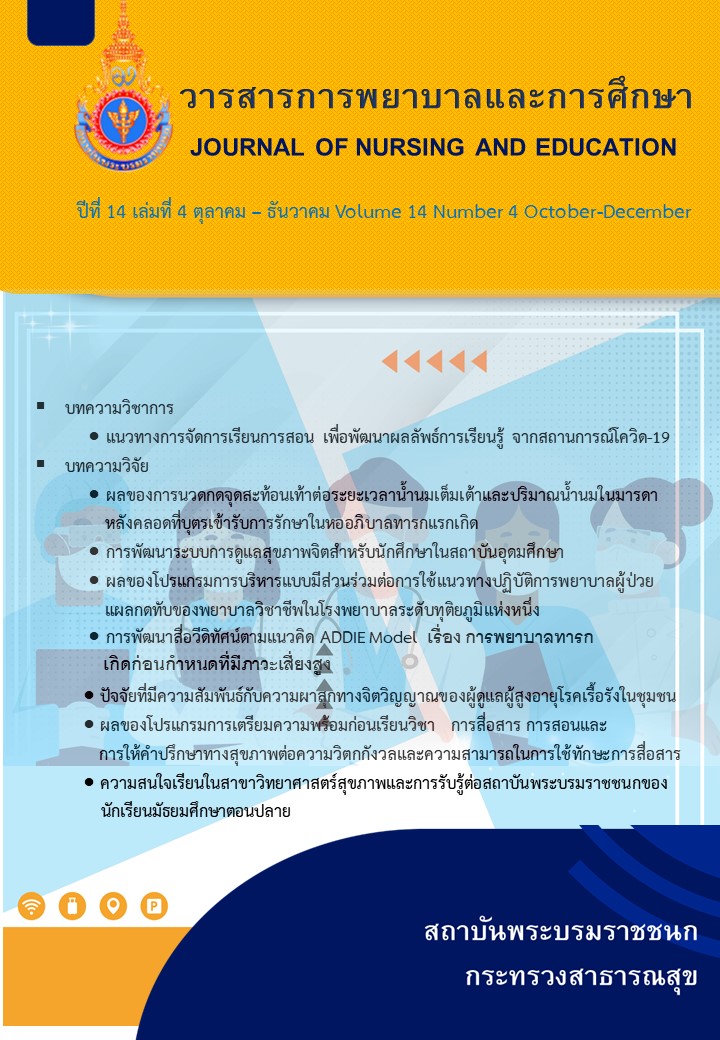Factors Related to Spiritual Well-Being among Caregivers of Elderly with Chronic Illness in Community
Keywords:
Spiritual well-being, Caregivers, Elderly with chronic illnessAbstract
Spiritual well-being among caregivers of elderly with chronic illness is essential element of holistic care. This research aimed to study level of spiritual well-being of caregivers and factors related to spiritual well-being among caregivers of elderly with chronic Illness in community. Ninety-two family caregivers of elderly with chronic illness in Bo Yai Subdistrict, Borabue district, Mahasarakham province were recruited in the study by using the simple random technique. Research instruments consisted of 7 parts: 1) Demographic Data Questionnaire of Caregivers and Elderly with Chronic Illness, 2) The Barthel of Activities of Daily Living Index, 3) The Caregiver and Patient Relationship Interview Form, 4) The Social Support Interview Form, 5) The Zarit Burden Interview Form, 6) The Religious Activities Interview Form and 7) The Spiritual Well-Being of Caregiver Interview Form. The Caregiver and Patient Relationship Interview Form, The Social Support Interview Form, The Zarit Burden Interview Form, The Religious Activities Interview Form and The Spiritual Well-Being of Caregiver Interview Form, reliability coefficients of these five instruments were .95, .96, .97, .90, and .95 respectively. Descriptive statistics and Pearson’s product moment correlation coefficient were used to analyze data.
The results revealed that level of spiritual well-being among caregivers of elderly with chronic illness in community was rated at a high level (M=81.88, SD=7.69). Factors that correlated with spiritual well-being among caregivers with chronic illness in community were the social support of caregiver (r = .711, p < .01), the caregiver burden
(r = -.663, p < .01), the religious activity of caregiver (r = .566, p < .01), the caregiver and patient relationship (r = .367, p < .01) and activities of daily living of elderly with chronic illness (r = .336, p < .01).
In conclusion, this study provided body of knowledge about the spiritual well-being among caregivers of elderly with chronic illness in community. the findings suggest that nurses and healthcare providers may apply these results to serve as baseline data for development of interventions aimed at enhancing spiritual well-being among caregivers of elderly with chronic illness through promoting social support, religious activity, caregiver and patient relationship, activities of daily living of elderly with chronic illness and aware of burden as perceived by these caregivers.
References
Department of Older Persons. Statistics of the elderly 77 provinces in Thailand data is presented as of December 31, 2020 [online]. 2020 [Cited 2021/7/5]. Available from:
https://www.dop.go.th/th/know/side/1/1/335 (in Thai)
Chen, M., Chen, K., and Chu, T. Caregiver Burden, Health Status, and Learned Resourcefulness of Older Caregivers. West J Nurs Res, 2015; 37(6): 767-80.
Chayawatto, C. Depression in the Caregivers of Stroke Patients. Region 4-5 Medical Journal, 2016; 35(1): 14-27. (in Thai)
Sihapark, S., Chuengsatiansup, K., and Tengrang, k. The Effect and Caregiving Burden of Older Person in Long-term Care Based on Thai Culture. Nonthaburi: Health Systems Research Institute, 2014. (in Thai)
Lekwong, S., Lawang, W., and Rattanagreethakul, S. Factors Affecting the Spiritual Well-being among Family Caregivers of Persons with Physical Disability. Journal of Phrapokklao Nursing College, 2019; 30(1): 102-112. (in Thai)
Chavapattanakul, P., Wongkumsin, T., and Kongkasuwan, R. The Relationship between Resilience Quotient, Social Support, and Spiritual Well-being of Caregivers of Patients with Hemiplegia. Siriraj Med J, 2020; 72(3): 245-52.
Mahiphun, L., Nabkasorn, C., and Vatanasin, D. Factors Related to Spiritual Well-being among Caregivers of Schizophrenic Patients. Journal of Public Health Nursing, 2017; 31(2): 29-42. (in Thai)
Rafati, F., Mashayekhi, F., Dastyar, N. Caregiver Burden and Spiritual Well-being in Caregivers of Hemodialysis Patients. J Relig Health, 2019; 59(6): 3084–96.
Promkeawngam, S. & Namwong, A. The Spiritual Well-being of Community-dwelling Thai Older People with Chronic Illness. Journal of Nursing and Health Care, 2017; 35(3): 204-13. (in Thai)
Lazarus, R. S. and Folkman, S. Stress, Appraisal, and Coping. New York: Springer, 1984.
Boston, P. H. and Mount, B. M. The Caregiver’s Perspective on Existential and Spiritual Distress in Palliative Care. J Pain Symptom Manage, 2006; 32(1): 13-26.
Hanh, P. T., Jullamate, P., and Piphatvanitcha, N. Factors Related to Caregiver Burden among Family Caregivers of Older Adults with Stroke in Hai Duong, Vietnam. The Southern College Network Journal of Nursing and Public Health, 2017; 4(3): 45-62. (in Thai)
Faul, F., Erdfelder, E., Lang, A.G., & Buchner, A. G* Power 3: A Flexible Statistical Power Analysis Program for the Social, Behavioral, and Biomedical Sciences. Behavior Research Methods, 2007; 39(2): 175-91.
Tirapaiwong, P. Patient-caregiver Relationship and Caregiver Burden of Family Member Caregivers of Patients with Stroke. Master Thesis in Nursing. Bangkok: Mahidol University, 1997. (in Thai)
Imote, P., Nimitarnun, N., Chomson, S., and Hematorn, C. Influencing Factors of Home Care Behaviors by Family Caregivers for Stroke Patients. Christian University Journal, 2009; 15(2): 130-41. (in Thai)
Toonsiri, C., Sunsern, R., and Lawang, W. Development of the Burden Interview for Caregivers of Patients with Chronic Illness. Journal of Nursing and Education, 2011; 4(1): 62-75. (in Thai)
Jitapunkul, S. Principles of Geriatric Medicine. Bangkok: Chulalongkorn University, 2001. (in Thai)
Cassidy, T. Benefit Finding through Caring: The Cancer Caregiver Experience. Psychology & Health, 2013; 28(3): 250-66.
Siritipakorn, P. & Muangpaisan, W. Associated Factors of Caregiver Burden among Family Caregivers of Dementia Patients in a Geriatric Clinic, Siriraj Hospital. Journal of Nursing Science & Health, 2015; 38(2): 54-64. (in Thai)
Downloads
Published
Issue
Section
License

This work is licensed under a Creative Commons Attribution-NonCommercial-NoDerivatives 4.0 International License.






